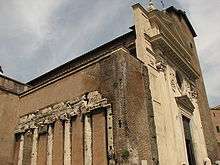Spes
In ancient Roman religion, Spes (pronounced [ˈspeːs]) was the goddess of hope. Multiple temples to Spes are known, and inscriptions indicate that she received private devotion as well as state cult.[1]
Republican Hope

During the Republic, a temple to "ancient Hope" (Spes vetus) was supposed to have been located near the Praenestine Gate.[2] It was associated with events that occurred in the 5th century BC,[3] but its existence as anything except perhaps a private shrine has been doubted.[4]
A well-documented temple of Spes was built by Aulus Atilius Calatinus[5] along with Fides, as the result of vows (vota) made to these goddesses during the First Punic War.[6]
At Capua in 110 BC, a temple was built to the triad of Spes, Fides, and Fortuna.[7]
Imperial Hope
Spes was one of the divine personifications in the Imperial cult of the Virtues. Spes Augusta was Hope associated with the capacity of the emperor as Augustus to ensure blessed conditions.[8]
Like Salus ("Salvation, Security"), Ops ("Abundance, Prosperity"), and Victoria ("Victory"), Spes was a power that had to come from the gods, in contrast to divine powers that resided within the individual such as Mens ("Intelligence"), Virtus ("Virtue"), and Fides ("Faith, Fidelity, Trustworthiness").[9]
Greek Elpis
The Greek counterpart of Spes was Elpis, who by contrast had no formal cult in Greece. The primary myth in which Elpis plays a role is the story of Pandora. The Greeks had ambivalent or even negative feelings about "hope",[10] and the concept was unimportant in the philosophical systems of the Stoics and Epicureans.[11]
References
- J. Rufus Fears, "The Cult of Virtues and Roman Imperial Ideology," Aufstieg und Niedergang der römischen Welt II.17.2 (1981), p. 837.
- Frontinus, De aquaeductu 1.19; Arnaldo Momigliano, "Religion in Athens, Rome, and Jerusalem in the First Century B.C.," in On Pagans, Jews, and Christians (Wesleyan University Press, 1987), p. 75.
- Livy 2.51.2; Dionysius of Halicarnassus 9.24.4; Momigliano, "Religion in Athens, Rome, and Jerusalem," p. 75.
- Fears, "The Cult of Virtues," p. 848.
- Cicero, De legibus 2.28; Momigliano, "Religion in Athens, Rome, and Jerusalem," p. 75.
- Fears, "The Cult of Virtues," p. 835.
- Inscriptiones Latinae Selectae 3770; Momigliano, "Religion in Athens, Rome, and Jerusalem," p. 75.
- J. Rufus Fears, "The Theology of Victory at Rome: Approaches and Problem," Aufstieg und Niedergang der römischen Welt II.17.2 (1981), pp. 812–814.
- Fears, "The Theology of Victory at Rome," p. 744.
- Momigliano, "Religion in Athens, Rome, and Jerusalem," p. 75. For instance, in the Suppliants of Euripides, Hope is characterized as "delusive; it has embroiled many a State" (line 479), as cited by Momigliano.
- Momigliano, "Religion in Athens, Rome, and Jerusalem," p. 75.
Further reading
| Wikimedia Commons has media related to Spes. |
- Clark, Mark Edward. "Spes in the Early Imperial Cult: 'The Hope of Augustus'." Numen 30.1 (1983) 80–105.
- . Encyclopædia Britannica (11th ed.). 1911.
